Poems for a "New Nature" with Ada Limón
Air Date: Week of September 6, 2024
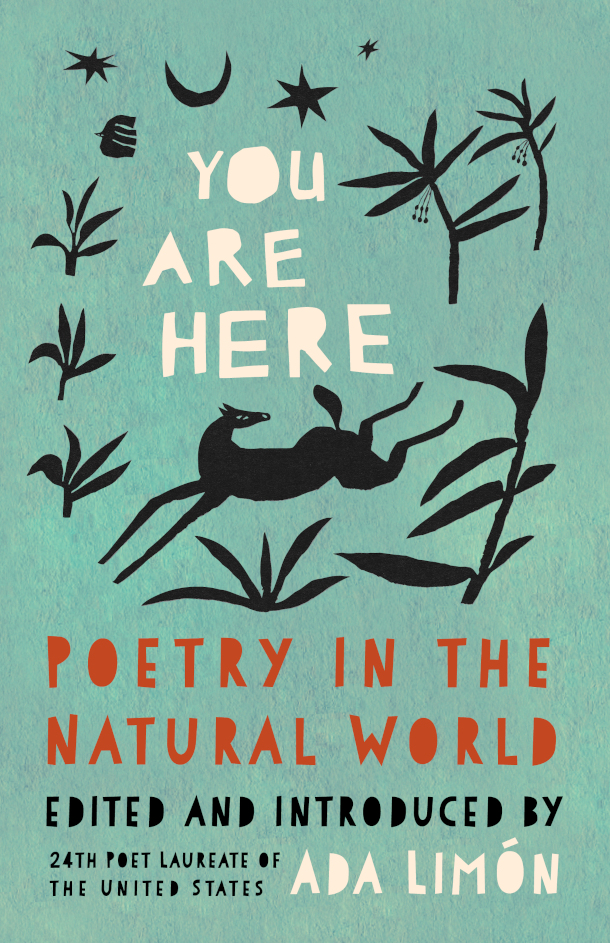
You Are Here: Poetry in the Natural World is a poetry collection edited by Ada Limón. (Photo: Courtesy of Milkweed)
Poetry can be up to the seemingly impossible task of capturing ecological loss, wild joy, and empathy for other species on this embattled planet. US Poet Laureate Ada Limón joins Host Jenni Doering to share poems from her new anthology, You Are Here: Poetry in the Natural World and discuss why she believes we need a new kind of nature poetry for the new nature amid the climate crisis.
Transcript
O’NEILL: It’s Living on Earth, I’m Aynsley O’Neill.
DOERING: And I’m Jenni Doering.
The environmental crises we are witnessing today can be so overwhelming, that it’s hard to fully capture in prose. But poetry is up to the task of conveying the complex emotions of ecological loss, wild joy, and empathy for other species on this embattled planet. You Are Here: Poetry in the Natural World is an anthology of poems collected by US Poet Laureate Ada Limón to challenge what we think we know about “nature poetry” in these changing times. Ada Limón joins us now. Welcome to Living on Earth!
LIMÓN: Thank you so much for having me. It's such a pleasure to be here.
DOERING: Well, it's a pleasure to have you. So, I have to say, this is a wonderful anthology. It's thought provoking. It's accessible too, though. What sparked this project for you?
LIMÓN: Every Poet Laureate is tasked by the Librarian of Congress to create a signature project, and I knew that I wanted to do something that would combine poetry and nature, so I wanted to make sure that I had a couple of different elements. One of the things was that I of course, wanted to celebrate the national parks and do something that felt like it was uplifting some of our protected spaces, but that felt like intentional nature, the nature that you plan for, the nature that you pack a bag for, the nature that in many ways, you pay for, because you're going in and you're going to either get a campground site or you're going to get a hotel. But I wanted the anthology, You Are Here: Poetry in the Natural World, to really be a counterbalance to the national parks project, so that we could also look at the everyday nature, the nature that's not necessarily intentional, but the nature that is all around us — the nature that we experience, whether it's in urban settings or in really beautiful, stunning locales. And that was really important to me. I wanted to make sure that every voice could be heard in this book. And I also wanted it to be very clear that no matter where you live, nature is everywhere, and that we are, ourselves, nature.
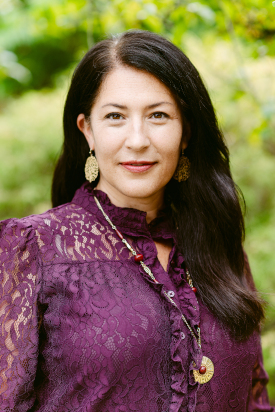
Ada Limón is the 24th Poet Laureate of the United States. (Photo: Ayna Lorenzo, Courtesy of the John D. and Catherine T. MacArthur Foundation)
DOERING: It's everywhere. You're right. And there's celebration in this book. You could maybe even call it worship of the natural world. There's also grieving for what's being lost to fires, floods, these things of the climate crisis. Talk to me about how poetry might help us all grapple with that grief.
LIMÓN: Thank you for that question, because I think that one of the reasons, I worked so hard on this project and support it with my whole body and soul is that I think we really needed a moment for a new nature poem, because we are living in a new nature. As the climate crisis deepens, worsens and we have more evidence of it every minute in our daily lives, it has felt like we can't return to the nature poem as a type of healing. Instead, we needed to turn to a nature poem that can include a type of grieving and can include a type of clear-eyed awareness of where we are, so that we might collectively move forward into some kind of action. And that's really what I thought poetry can do in this certain moment, is make space for that enormity of feeling, that range of feeling, which can certainly be wonder, awe, joy, the feel of ease, the feel of connectedness, the feel of, "I am not alone. In fact, I am instead a being connected to all things wondrous on the planet," and that's there. But I also wanted to make room for the space for solastalgia, for missing the place that we are right now, knowing it will change and shift. And I think poetry is a place that makes room for the entire spectrum of human emotion. And so, this was the project to pay homage to where we are right now, and You Are Here as the title also felt like you are here as a mantra in many ways.
DOERING: Is there any particular poem that speaks to sort of grappling with where we are at this moment?
LIMÓN: They're all doing different things, so I don't think there's one necessarily that's a call out, but I do love the "Reasons to Live" at the end by Ruth Awad, which is such a beautiful, stunning poem, which to me, really encompasses all of the ways in which we have to not only struggle with our existence on this planet and our connection to this planet, but also that we have to recommit to living here and recommit to this life in all its complexities. And I think that sometimes that can be very difficult, and so that recommitment feels really evident in that final poem.
DOERING: Ada, could you please read us that poem, "Reasons to Live" on page 145?
LIMÓN:
"Reasons to Live"
Because if you can survive
the violet night, you can survive
the next, and the fig tree will ache
with sweetness for you in sunlight that arrives
first at your window, quietly pawing
even when you can't stand it,
and you'll heavy the whining floorboards
of the house you filled with animals
as hurt and lost as you, and the bearded irises will form
fully in their roots, their golden manes
swaying with the want of spring —
live, live, live, live! —
one day you'll put your hands in the earth
and understand an afterlife isn't promised,
but the spray of scorpion grass keeps growing,
and the dogs will sing their whole bodies
in praise of you, and the redbuds will lay
down their pink crowns, and the rivers
will set their stones and ribbons
at your door if only
you'll let the world
soften you with its touching.
DOERING: I love that that's the last line in this book. "If only you'll let the world soften you with its touching."
LIMÓN: When I read this poem, I just knew it had to be the last poem of the book. I felt like, if there was one message, it was to be a receiver of the world. And I felt like Ruth's poem just made such a beautiful offering to really open us up to receiving the world.
DOERING: All right. Well, there's another poem that kind of speaks to me in a similar way, "Heliophilia," on page 133 by Aimee Nezhukumatathil.
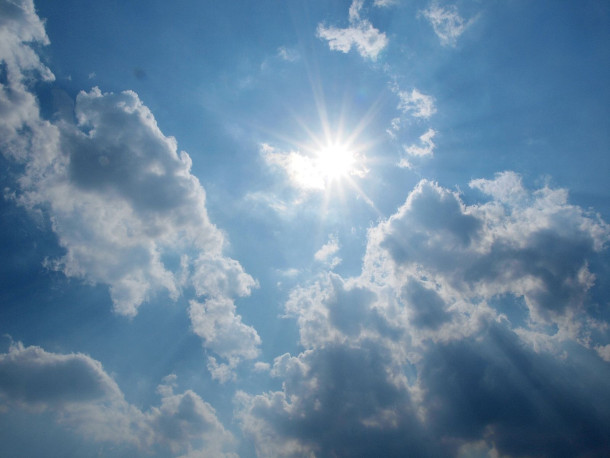
“Heliophilia,” by Aimee Nezhukumatathil, is a poem that encourages readers to lean into joy. (Photo: Kreuzschnabel, Wikimedia Commons, CC BY-SA 3.0)
LIMÓN:
"Heliophilia"
Desire to stay in the sun / love love of sunlight
Don't call it an affliction —
call it affection. I'd stay under
the sun all day, never hiding
under a copse of trees if I knew
I wouldn't burn, but isn't it
more accurate that I burn
for the sun? To be pulled to the light
is nothing to be ashamed of: look
at flowers, butterflies, seals lounging
on a rock. Rhubarb sings in dark gardens
but truth be told it sounds more like
a wet cracking and popping. I think
it secretly counts the hours till it can turn
towards the sun again. For me, the sun
has always been easy to love, as easy
as it is to love whatever small light
bees bestow on fallen leaves—easy
to love the light they give just before
they crawl into a honey-hungry sleep,
just before the first fall of snow.
DOERING: "Honey-hungry sleep." Beautiful. Ada, what stood out to you about this poem?
LIMÓN: To me, this idea of the rhubarb singing in the dark, and this idea of also that sometimes we feel shame that we want the light, and I feel like that's so important right now. I think that there's so oftentimes, as we know, our brains have the negativity bias that we are wired for per evolution, that we keep seeking out the danger, looking for the worry, following the anxiety, the trail of fear. And this is a poem that releases us to the light, that gives us the light that keeps saying, "Don't be ashamed to search for it, to lean into it." We worry about hope, I think. We worry that we're naive for it. And I think this is a poem that's saying, searching for the light and leaning into hope is not naive, but it can be hard won, and it is also our nature. Sometimes we lose track of that. We think it's our nature to go to the dark parts, to go to the worst-case scenario, but it is also our nature to seek out the light.
DOERING: You're the U.S. Poet Laureate. And the U.S. is a big country with a lot of different diverse cultures and subcultures, and this book features a lot of different voices in it. How would you say that these diverse perspectives build upon each other in You Are Here?
LIMÓN: For me, one of the things that's really important about this book is that it is representative, at least in a small way, of the many different landscapes and the many different voices that are writing today. Some of the poems are people who are deeply connected to nature, who felt deeply connected to nature their whole lives. And then some of the voices are from poets that are laughing that they don't ever know the names of trees. And I think that's really important too, because there's a way in which I can say, "Oh, yeah, I was raised in California, northern California. I have a deep connection with nature. It's always been the place that I go to for a type of healing, a type of solace and a type of peace." But there are a lot of folks that I know that are like, you know, “nature's where bad things happen. You know, nature is not the safe place, or nature has always been a white space, a place where I don't feel like I'm welcome, or I feel, in fact, my body might be harmed in some way.” And so, I wanted to make sure that all of those voices were heard in this book.
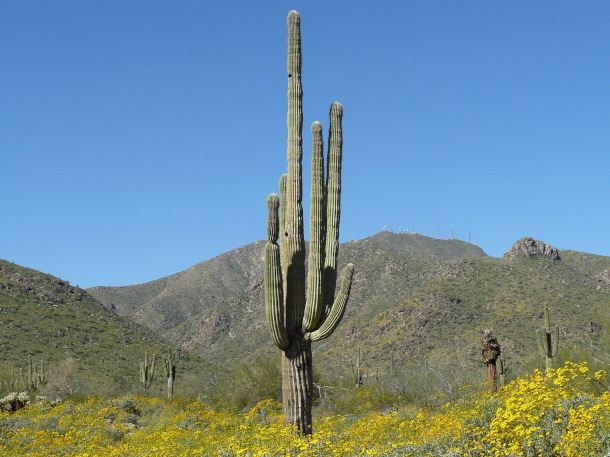
Eduardo C. Corral’s poem, “To a Blossoming Saguaro,” explores discusses the links between nature and politics. (Photo: Joyce Cory, Flickr, CC BY 2.0)
DOERING: Could we get you to read one more poem? It's "To a Blossoming Saguaro" by Eduardo C. Corral, on page 17.
LIMÓN:
"To a Blossoming Saguaro"
You have kin in Mexico.
Shooting you is called "cactus plugging."
Humidity & wind speed shape the path of a bullet.
Your shadow will outlive my father.
That's kind of comforting.
Ghost-faced bats pollinate your dog-eared flowers
which smell like wet rope, melon.
The sky is a century with no windows.
I say things like that. Sorry.
You have more rights than the undocumented:
I need a permit to uproot you.
Ofelia believes only rain can touch all of you.
My mother is my favorite immigrant.
After her? The sonnet.
DOERING: There's so much in such a short poem.
LIMÓN: Yeah, I think Eduardo C. Corral is a master of really condensing great, heightened emotion as well as transformative images in a short poem. And when he sent this, I was just blown away. And the saguaro is one of my favorite plants. To think of it as also something that has more rights than the undocumented is an incredible line. I think it gives a lot to think about when we think about this country and what we protect, and what we can get people to think of in terms of requiring safety and security. And I think this poem is both beautiful and absolutely true in its nature.
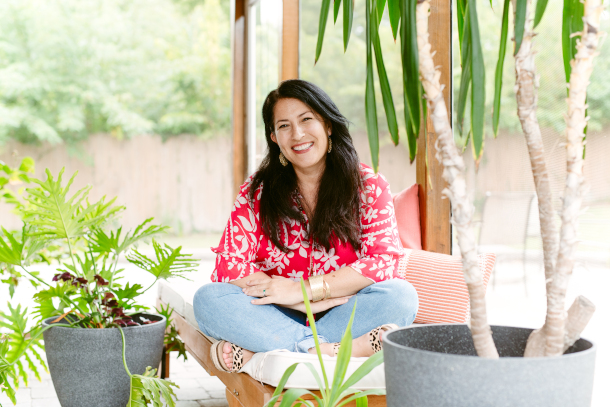
Ada Limón has always felt a deep connection to the natural world. In this anthology, she chose to feature poets from a range of perspectives. (Photo: Ayna Lorenzo, Courtesy of the John D. and Catherine T. MacArthur Foundation)
DOERING: What do you hope readers take away from this collection of poems?
LIMÓN: I have many hopes, and I can get really big with my hopes. If I could say, what do I really want readers to take away? I would say that we must save this planet. If we are writing toward it, offering something back like love, appreciation, affection, worry, tenderness, then doesn't that say we must collectively create a movement that speaks to the importance of this planet and the reciprocal nature of nature and ourselves? I would love for people to write their own poem, and that in that writing of their own poem that they might be able to create their own kind of reciprocity with the natural world they see out their window they see every day on the way to the bus stop, whatever it is that they have a relationship to. Even if they don't think of themselves as a poet or as a writer or even as an artist in any way, maybe it's time to start and offer something back. There's a hashtag. If they want to share a poem, they don't have to — private poems are just as important — but it's #youareherepoetry. But I would love for people to reimagine their own relationships to the landscape around them, and in doing so, maybe deepen their own connection to the planet and beyond that, maybe work towards ways in which we can address this really urgent moment on the planet.
DOERING: Ada Limón is the 24th Poet Laureate of the United States, and collected the poems in You Are Here: Poetry in the Natural World. Thank you so much, Ada.
LIMÓN: Thank you so much for having me. It's just such a pleasure to talk to you.
Links
Living on Earth wants to hear from you!
Living on Earth
62 Calef Highway, Suite 212
Lee, NH 03861
Telephone: 617-287-4121
E-mail: comments@loe.org
Newsletter [Click here]
Donate to Living on Earth!
Living on Earth is an independent media program and relies entirely on contributions from listeners and institutions supporting public service. Please donate now to preserve an independent environmental voice.
NewsletterLiving on Earth offers a weekly delivery of the show's rundown to your mailbox. Sign up for our newsletter today!
 Sailors For The Sea: Be the change you want to sea.
Sailors For The Sea: Be the change you want to sea.
 The Grantham Foundation for the Protection of the Environment: Committed to protecting and improving the health of the global environment.
The Grantham Foundation for the Protection of the Environment: Committed to protecting and improving the health of the global environment.
 Contribute to Living on Earth and receive, as our gift to you, an archival print of one of Mark Seth Lender's extraordinary wildlife photographs. Follow the link to see Mark's current collection of photographs.
Contribute to Living on Earth and receive, as our gift to you, an archival print of one of Mark Seth Lender's extraordinary wildlife photographs. Follow the link to see Mark's current collection of photographs.
 Buy a signed copy of Mark Seth Lender's book Smeagull the Seagull & support Living on Earth
Buy a signed copy of Mark Seth Lender's book Smeagull the Seagull & support Living on Earth

